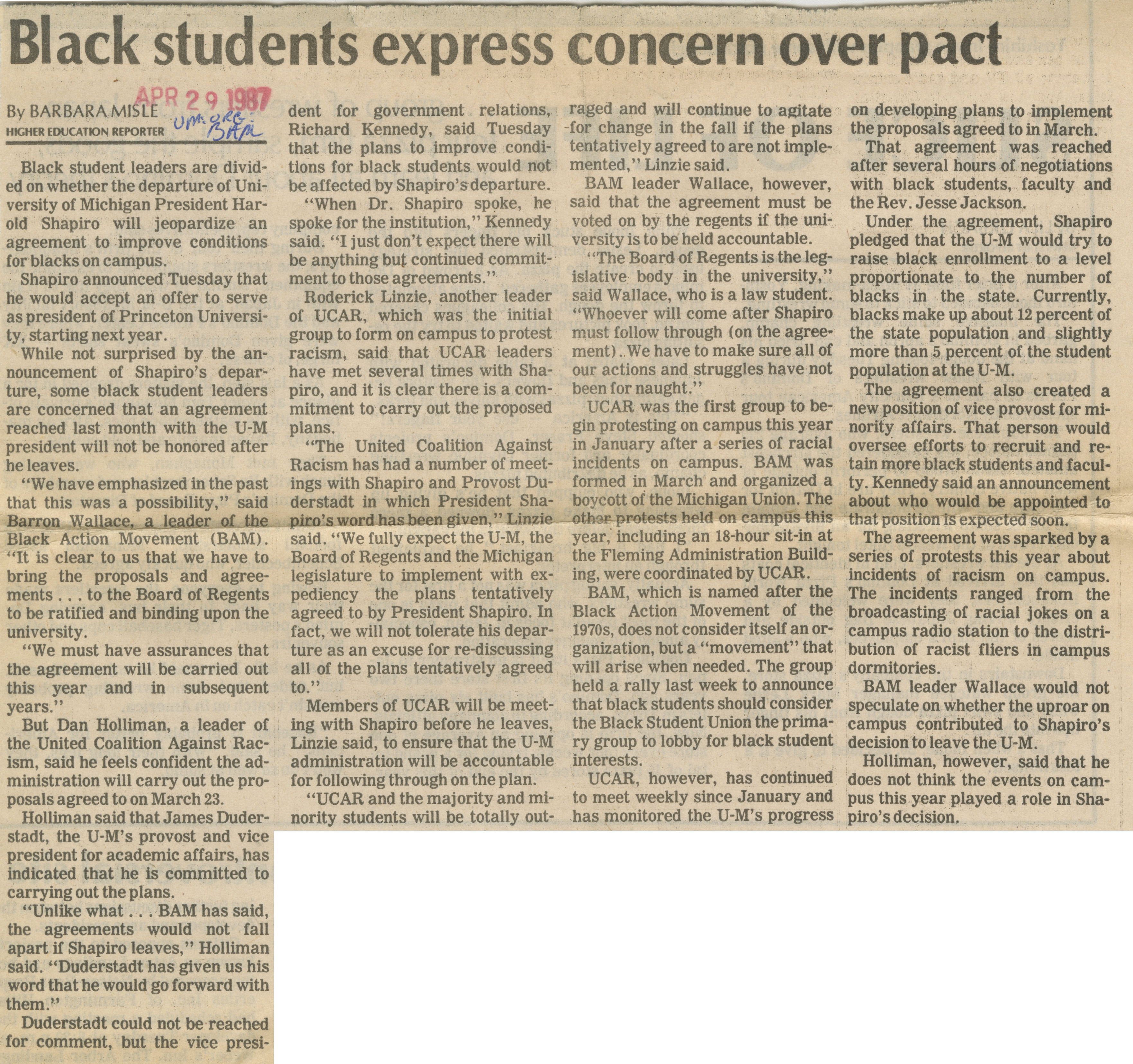Black Students Express Concern Over Pact

Black students express concern over pact
By BARBARA MISLE
HIGHER EDUCATION REPORTER
Black student leaders are divided on whether the departure of University of Michigan President Harold Shapiro will jeopardize an agreement to improve conditions for blacks on campus.
Shapiro announced Tuesday that he would accept an offer to serve as president of Princeton University, starting next year.
While not surprised by the announcement of Shapiro’s departure, some black student leaders are concerned that an agreement reached last month with the U-M president will not be honored after he leaves.
“We have emphasized in the past that this was a possibility,” said Barron Wallace, a leader of the Black Action Movement (BAM). “It is clear to us that we have to bring the proposals and agreements ... to the Board of Regents to be ratified and binding upon the university.
“We must have assurances that the agreement will be carried out this year and in subsequent years.”
But Dan Holliman, a leader of the United Coalition Against Racism, said he feels confident the administration will carry out the proposals agreed to on March 23.
Holliman said that James Duderstadt, the U-M’s provost and vice president for academic affairs, has indicated that he is committed to carrying out the plans.
“Unlike what.. . BAM has said, the agreements would not fall apart if Shapiro leaves,” Holliman said. “Duderstadt has given us his word that he would go forward with them.”
Duderstadt could not be reached for comment, but the vice president for government relations, Richard Kennedy, said Tuesday that the plans to improve conditions for black students would not be affected by Shapiro’s departure.
“When Dr. Shapiro spoke, he spoke for the institution,” Kennedy said. “I just don’t expect there will be anything but continued commitment to those agreements.”
Roderick Linzie, another leader of UCAR, which was the initial group to form on campus to protest racism, said that UCAR leaders have met several times with Shapiro, and it is clear there is a commitment to carry out the proposed plans.
“The United Coalition Against Racism has had a number of meetings with Shapiro and Provost Duderstadt in which President Shapiro's word has been given.” Linzie said. “We fully expect the U-M, the Board of Regents and the Michigan legislature to implement with expediency the plans tentatively agreed to by President Shapiro. In fact, we will not tolerate his departure as an excuse for re-discussing all of the plans tentatively agreed to.”
Members of UCAR will be meeting with Shapiro before he leaves, Linzie said, to ensure that the U-M administration will be accountable for following through on the plan.
“UCAR and the majority and minority students will be totally outraged and will continue to agitate for change in the fall if the plans tentatively agreed to are not implemented,” Linzie said.
BAM leader Wallace, however, said that the agreement must be voted on by the regents if the university is to be held accountable.
“The Board of Regents is the legislative body in the university,” said Wallace, who is a law student. “Whoever will come after Shapiro must follow through (on the agreement) . We have to make sure all of our actions and struggles have not been for naught.”
UCAR was the first group to begin protesting on campus this year in January after a series of racial incidents on campus. BAM was formed in March and organized a boycott of the Michigan Union. The other protests held on campus this year, including an 18-hour sit-in at the Fleming Administration Building, were coordinated by UCAR.
BAM, which is named after the Black Action Movement of the 1970s, does not consider itself an organization, but a “movement” that will arise when needed. The group held a rally last week to announce that black students should consider the Black Student Union the primary group to lobby for black student interests.
UCAR, however, has continued to meet weekly since January and has monitored the U-M’s progress on developing plans to implement the proposals agreed to in March.
That agreement was reached after several hours of negotiations with black students, faculty and the Rev. Jesse Jackson.
Under the agreement, Shapiro pledged that the U-M would try to raise black enrollment to a level proportionate to the number of blacks in the state. Currently, blacks make up about 12 percent of the state population and slightly more than 5 percent of the student population at the U-M.
The agreement also created a new position of vice provost for minority affairs. That person would oversee efforts to recruit and retain more black students and faculty. Kennedy said an announcement about who would be appointed to that position is expected soon.
The agreement was sparked by a series of protests this year about incidents of racism on campus. The incidents ranged from the broadcasting of racial jokes on a campus radio station to the distribution of racist fliers in campus dormitories.
BAM leader Wallace would not speculate on whether the uproar on campus contributed to Shapiro’s decision to leave the U-M.
Holliman, however, said that he does not think the events on campus this year played a role in Shapiro’s decision.
Article
Subjects
Barbara Misle
University of Michigan - Racism
Demonstrations & Protests
University of Michigan - Students
Black Americans
Black Action Movement (BAM)
Black History
University of Michigan - Faculty & Staff
United Coalition Against Racism (UCAR)
Black Student Union (BSU)
Michigan Union
Sit-Ins
University of Michigan - Enrollment
University of Michigan - Board of Regents
Old News
Ann Arbor News
Harold T. Shapiro
Barron Wallace
Dan Holliman
James Duderstadt
Richard Kennedy
Roderick Linzie
Jesse Jackson